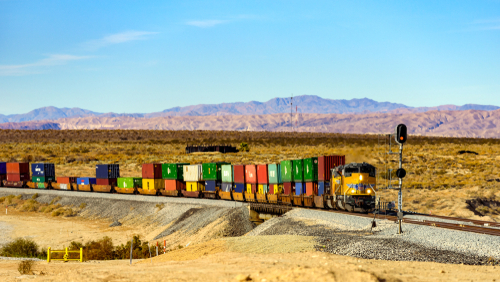Rail/Intermodal
North American carload volumes were down 4.1% y/y for week 16, marking the 12th week of y/y declines in 2024, according to data from the Association of American Railroads. The commodities experiencing the greatest y/y declines include coal, metallic scrap, and farm products, which were down 27.6%, 11.3%, and 8.9%, respectively.
Commodities recording the greatest growth were petroleum products, motor vehicles, and forest products, up 17.2%, 7.4%, and 7.1%, respectively. Economically sensitive freight, which excludes grain, petroleum, and coal, saw a moderate increase of 1.8%, primarily due to the exclusion of coal.
Intermodal volumes for week 16 were up 7.1% y/y with containers up 8.3% and the much smaller trailer traffic down 18.3%. Total intermodal traffic has been outperforming carloads so far this year, posting y/y increases in 15 of 16 weeks so far.
Year to date, total rail traffic is up 2.1% y/y, driven by intermodal traffic, which is up 8.5%. Carload traffic is down 3.9%. The decline in carloads is primarily due to coal, which is down 16.0%. However, most commodity groups have struggled this year, with seven of the 10 commodity groups posting negative year-to-date growth.
Four of those groups are positive y/y in U.S.-only traffic, but in each case, those comparisons are just barely above flat. Petroleum products, chemicals, and motor vehicles are the only commodities that have posted y/y increases in North American traffic for the year to date, rising by 7.1%, 3.8%, and 2.8%, respectively.
CARB Regulation of Locomotives
On a regulatory front, the Surface Transportation Board, AAR, and others filed comments with the Environmental Protection Agency (EPA) regarding the California Air Resources Board (CARB) regulation that would bar diesel locomotives 23 years and older from operating in California starting in 2030 and would require that newly built locomotives built after certain dates and operated in California be zero emissions. Under the CARB rule, linehaul locomotives operating in the state would have to be zero emissions by 2035.
Comments were in response to a proceeding in which EPA will decide whether to accept or reject CARB’s request to proceed with the mandates. STB’s submission explains that state legislation can potentially be preempted by federal law.
While STB did not provide an official stance on the CARB regulation, it said the rule “directly targets rail transportation, and thus gives rise to the patchwork concerns that have led both courts and the Board to find certain state laws preempted” under the Interstate Commerce Commission Termination Act.
Not surprisingly, AAR took a more aggressive stance against EPA authorizing the regulation, which it called “technologically infeasible.” The association said that potentially banning internal combustion engines in the rail industry is a major question for Congress, not EPA and the state of California.
For comments and other documents in the EPA proceeding, click HERE.

